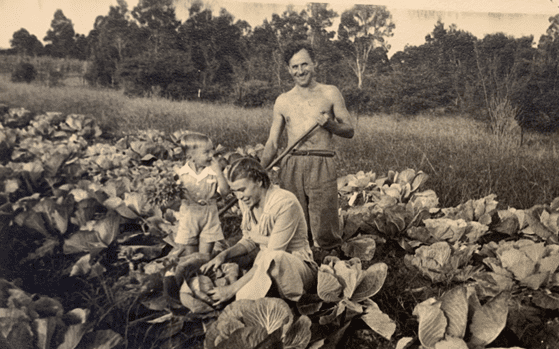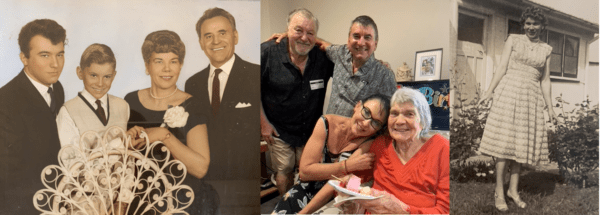A great grandmother born at the height of the Russian Revolution celebrated her 101st birthday with her sons by her side at Ozcare on the Sunshine Coast.
Born in the city of Leningrad in 1920, Marianna Sidovenko has survived famine, war and a daring escape to Australia during an extraordinary life that has followed some of the most significant events in modern world history.
Her sons George and Alex, who joined the party at Ozcare’s Caroline Chisolm Aged Care Facility at Currimundi, reflected on their mother’s incredible journey to becoming a centenarian.
“Mum had one shoe on when we arrived in Australia and dad had a suitcase that was practically empty,” George said. “They didn’t have much but they had a lot of dreams.”
The family’s journey to Australia ended years of struggle for freedom through those countries ravaged by war and famine. Just a teen at the time, his mother was marched out of Russia into a WW2 labour camp and never saw her family again. Amongst thousands of Russians captured in the Siege of Leningrad, Marianna met and fell in love with her husband Leon, a Russian army colonel with royal blood lines.
As George recalls, they survived years of terrible conditions inside the camp, which was set up to supply German munitions during the war. When the war was ended, the Russian survivors were being rounded up by the British to be sent back to Leningrad for retribution. However, they escaped and fled to Italy before making their way to Australia. They hid in fields and caves in Italy before they were picked up by a British convoy on the way to boarding the USS S D General Sturgis, a military transport ship, to Sydney.
“They were being hunted down by the British so there were people helping them hide and escape,” George explained. “Lenin was offering pieces of gold to the British for every soldier returned to Russia, so they changed their name. It was to try to throw them off the scent.”
Luckily, they all made it to safety, but it would be decades before his mother returned to Russia to find her family.
“She was very attached to her mother and father. They were a happy family, but she never saw them again,” George said.
Her father had become the head of a collective during the Soviet uprising and was responsible for stockpiling wheat and other goods.
As a child, she learnt to speak German and was working as a bookkeeper at the age of 18 when war broke out. “Conditions were very bad in Leningrad (now St Petersburg), and they were struggling to eat so her mother sent her out to collect some frozen cabbage to make soup and that was the last they ever heard of her,” George said.
“The Germans captured her in a field, and they were going to shoot her as a partisan but she could speak German so that is what saved her. “Mum was taken to the labour camps in Germany where she met Dad.
“When they arrived in Australia, they lived on a five-acre farm in Cabramatta in Sydney in an army donger that had a dirt floor. It is my first memory.”
He said his younger brother Alex was born in 1953 and the family worked hard to build up a small property portfolio from a railway income earnt by his father. By the time of his death at the age of 59, the family had property in some of Sydney’s most affluent suburbs. However, George said it broke his heart that his father never had his civil engineering qualifications recognised.
“Dad’s family had ties to the Russian royal family dating back to the 1700s and had lived a rather charmed life before the war,” he said.
“Mum has two granddaughters, two great granddaughters and a grandson on the way in March next year. She has lived a tough life, but we are so happy to see her reach this huge milestone birthday.”


